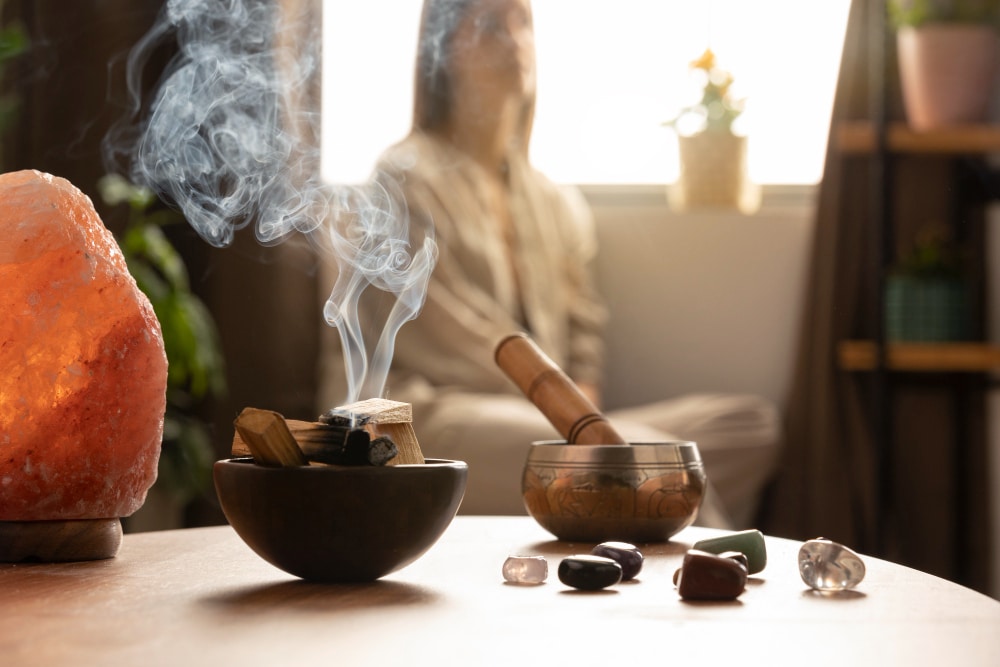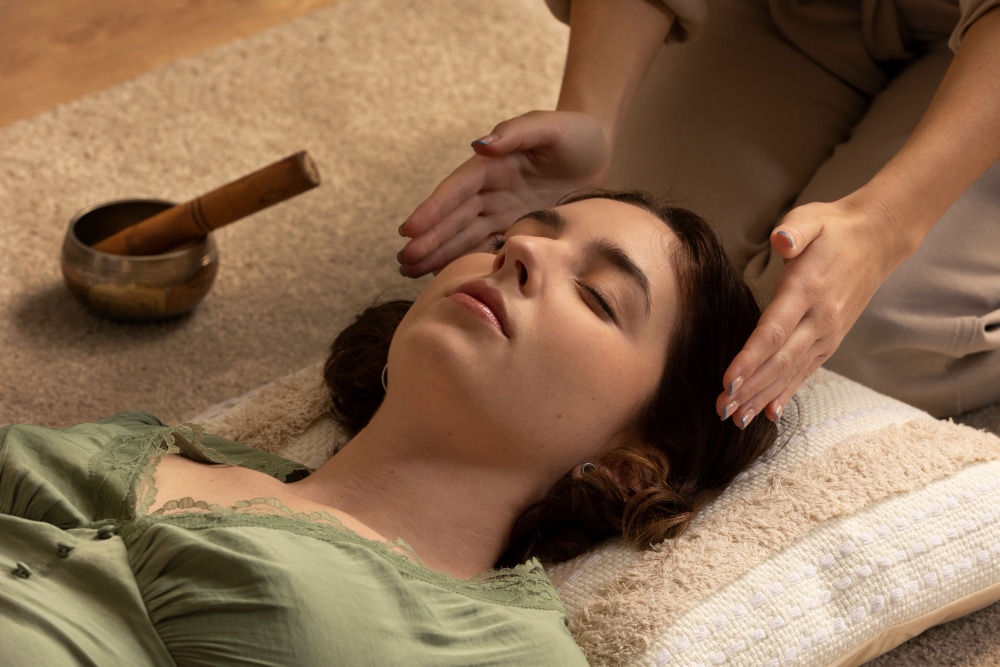Afterpay & ZIP Available
Same-day dispatch on orders before 3pm
10% OFF your first order: WELCOME10

Reiki is a healing practice which began from Japan. It is a type of energy healing that restores balance and harmony to the mind, body, and spirit. Reiki works by channelling life force energy, or “ki”, to the recipient in order to promote healing. Reiki is a safe, non-invasive, and natural form of healing that can be used to help with many physical, mental, and emotional issues.
Reiki practitioners are trained to facilitate this energy flow, offering a unique therapeutic experience. Through the skilled hands of reiki practitioners, individuals can access deep levels of relaxation and healing, addressing a variety of ailments and stressors.
Today, we’ll tell you all about Reiki. We’ll cover its history, principles, benefits, and much more. So, let’s get started.
The history of Reiki, a profound and transformative healing practice, can be traced back to the early 1900s when Dr. Mikao Usui, after extensive research and meditation, introduced this unique method.
Dr. Usui, often revered as the first Reiki master, established a healing system harnessing the power of life force energy. This energy, central to Reiki therapy, is believed to be identical to the universal energy that flows through all living things, offering a source of balance and healing.
It marks the beginning of what has now become a globally recognized and practised form of alternative healing.
Under the guidance of a Reiki master, individuals can experience the full benefits of Reiki therapy. This form of healing transcends the mere physical aspects, delving into the mental, emotional, and spiritual realms.
During a Reiki session, the practitioner channels this life force energy into the recipient, aiming to restore equilibrium within the body’s energy systems. It’s a holistic approach, wherein a Reiki session becomes not just a means of physical healing but a journey towards overall wellbeing, deeply rooted in the origins of this centuries-old practice.
The legacy of Dr. Usui’s work has thus paved the way for a healing modality that continues to evolve and adapt, offering solace and rejuvenation to countless individuals around the world.

Reiki, an ancient Japanese healing technique, is grounded in five fundamental principles that guide the practice.
These principles are not just guidelines for Reiki therapy but also serve as a compass for personal and spiritual growth.
This principle, a cornerstone in Reiki training, advocates for embracing the present and letting go of fretful thoughts about the future. It’s a call to trust the process of life, which in turn can lead to a more serene and balanced existence.
In a Reiki session, this principle helps clients release worry, fostering a therapeutic environment conducive to healing.
Anger can be a destructive emotion, and this principle aids in its management. Usui Reiki teaches that while anger is natural, it should not dominate our actions or thoughts.
By applying this principle, Reiki practitioners and clients learn to approach situations with calmness and clarity, leading to better emotional regulation and well-being.
This principle emphasises respect and gratitude for those who have shaped our lives. It encourages acknowledging the wisdom and experiences passed down, which can be a source of strength and guidance.
In the context of Reiki therapy, this respect translates into a deeper understanding and appreciation of life’s journey.
Reiki upholds the value of honesty, not just in one’s personal life but also professionally. This principle promotes ethical conduct and integrity, which are vital for inner peace and spiritual growth.
In practising Reiki, adhering to this principle ensures a genuine and trustworthy healing environment.
This principle highlights the importance of gratitude in fostering a harmonious relationship with the world. In Reiki practice, it translates to a deep appreciation for the energy shared and received, strengthening the bond between all living beings.
Embracing this principle enhances the therapeutic experience for both the Reiki practitioner and the client.

Reiki, as a part of complementary and alternative medicine, has gained recognition for its extensive health benefits. It’s a versatile modality used not only for personal wellness but also as a complementary reiki approach alongside other treatments, enhancing overall health and well-being.
Let’s explore some of the health benefits of reiki.
Other than being an effective stress reliever, Reiki aids in calming the nervous system. It’s particularly beneficial in today’s fast-paced world, where stress is a common ailment.
Reiki sessions provide a sanctuary of tranquillity. Thus allowing the body to enter a state of deep relaxation. This relaxation response is crucial in mitigating the effects of chronic stress, leading to improved sleep patterns and a more balanced emotional state.
Reiki healing is known for its holistic approach to improving health. By promoting better circulation and a stronger immune response, Reiki supports the body’s natural healing processes.
This form of energy healing is especially beneficial for those recovering from illness or surgery, as it aids in faster recuperation and lessens the impact of side effects.
Additionally, Reiki’s energy-balancing properties contribute to overall vitality and well-being.
The practice of Reiki plays a significant role in mental and emotional health. By harmonising the mind and emotions, Reiki creates a sense of inner peace and stability. This balance is particularly effective in managing mood swings and emotional distress, making it a valuable tool in mental health care.
Furthermore, regular Reiki sessions can lead to improved self-esteem and a more positive outlook on life.
Reiki’s impact extends beyond physical and mental health, fostering deep spiritual awareness and growth. It acts as a bridge for connecting individuals to their inner wisdom and the larger universe. This spiritual connection, nurtured through Reiki, encourages a journey of self-discovery and enlightenment.
Reiki practitioners often report a heightened sense of purpose and a deeper understanding of their life’s journey.

Reiki operates by channelling life force energy, commonly referred to as “ki”, directly to the recipient, which facilitates the process of healing. This energy, integral to the practice, is considered identical to the universal energy that interconnects all of existence.
Its primary purpose is to restore balance and promote healing within the body. In a typical Reiki session, the practitioner uses their hands to direct this energy, often without needing physical contact, allowing it to flow to areas in need of healing. This process is believed to activate the body’s natural healing abilities, aligning the energy centres, known as chakras, and thereby restoring physical, mental, and emotional well-being.
Reiki is unique in its approach as it transcends just the physical aspects of healing, delving into the emotional and spiritual realms, thereby offering a holistic healing experience. It is this ability to operate on multiple levels that makes Reiki training is a versatile and widely sought-after form of alternative therapy.
Reiki represents a distinct form of energy healing, one that is dedicated to reinstating balance and harmony across the body, mind, and spirit.
Central to this practice is the Reiki energy, a kind of healing energy that is synonymous with the universal life force permeating everything in existence. This energy is harnessed during a reiki treatment, where it is channelled to align and heal the body.
In a typical Reiki session, the practitioner becomes a conduit for this energy, directing it to specific areas of the recipient’s body to facilitate healing and restore equilibrium.
The power of reiki energy is renowned for its gentle yet powerful healing properties. It’s often used as a complementary therapy, working alongside traditional medical treatments to enhance recovery and provide relief from various ailments. This synergistic approach allows for a more holistic healing experience, addressing not only physical symptoms but also emotional and mental imbalances.
Multiple sessions of reiki treatment can lead to significant improvements in overall well-being, reducing stress, alleviating pain, and fostering a deeper sense of peace and contentment.
As a form of non-invasive therapy, Reiki is suitable for individuals of all ages and conditions, making it an inclusive and accessible form of healing.

Reiki is typically administered through a hands-on approach, where a Reiki practitioner gently places their hands on or slightly above various areas of the recipient’s body. This technique facilitates the flow of energy from the practitioner to the recipient, targeting specific areas that require healing.
The practitioner’s hands act as conduits for this healing energy, guided by the principles and practices of Reiki. Some practitioners even use Satya reiki power incense to elevate the experience.
In addition to in-person reiki treatment sessions, Reiki can be effectively conducted remotely, known as distance healing. This aspect of Reiki is based on the idea that energy is not confined by physical distance, allowing the practitioner to send healing energy to the recipient, regardless of their location.
Distance healing is particularly beneficial for those who are unable to attend in-person sessions due to distance, mobility issues, or other constraints. It follows the same principles as a hands-on session, with the practitioner focusing their intent and energy towards the recipient.
In both in-person and distance Reiki sessions, the recipient often experiences a sense of deep relaxation and peace, which is conducive to the body’s natural healing process.
The versatility in the administration of Reiki makes it an accessible and adaptable form of healing, suitable for a diverse range of needs and situations.
Finding a qualified Reiki practitioner is a vital step in ensuring you receive the most effective and safe Reiki experience.
Here are some tips and considerations to help you in your search:
A qualified Reiki practitioner should have completed training and received certification from a reputable Reiki master or organisation. Inquire about their level of training – Reiki I, II, or Master level – and the type of Reiki they practice, such as Usui Reiki or another variant.
Experience is a significant indicator of proficiency. Ask how long they have been practising Reiki and the types of clients or conditions they have worked with. An experienced practitioner is likely to have encountered a wide range of scenarios and developed a deeper understanding of energy work.
Many Reiki practitioners are members of professional bodies or associations. These affiliations often require a certain standard of practice and ethical conduct, providing an added layer of trust and professionalism.
Personal recommendations from friends, family, or healthcare professionals can be invaluable. Hearing firsthand experiences can provide insights into a practitioner’s approach and effectiveness.
Communication is key in any therapeutic relationship. During your initial contact, assess how well the practitioner explains the process and responds to your questions. It’s important that you feel comfortable and at ease with them.
Practicalities such as location, session length, and cost are also important. Ensure that their availability aligns with your schedule and that the costs are within your budget.
Lastly, trust your instincts. A practitioner might be highly qualified, but it’s essential that you feel a positive connection and trust in their ability to facilitate your healing journey.
Taking these steps can help you find a Reiki practitioner who is not only qualified but also the right fit for your individual needs and preferences.
To quickly conclude your question what is reiki – reiki is a powerful form of energy healing that can be used to promote physical, mental, and emotional wellbeing. It can help with many issues, including stress relief, improved health, mental and emotional balance, and spiritual growth.
Reiki works by channeling life force energy, or “ki”, to the recipient in order to promote healing. Reiki is a safe, non-invasive, and natural form of healing that can be used to help with many physical, mental, and emotional issues.
Reiki is a great tool for stress relief, improved health, mental and emotional balance, and spiritual growth. It can help to reduce pain, improve circulation, and boost the immune system.
It can also help to reduce anxiety and stress, reduce depression and anxiety, and promote feelings of peace and calm.
If you’re interested in trying Reiki, it’s important to find a qualified Reiki practitioner. Look for someone who is certified and experienced in the practice.
You can also look for online Reiki classes or distance healing sessions if you’re unable to find a local practitioner.

Collections
Subscribe
Sign up to our mailing list to get 10% off your first order, find out about new products and weekly sales.
2024 Incensen
Thank you for signing up for Incensen.
Your 10% off code is:
Sign up for our mailing list to get 10% off your first order and learn about new products and sales.